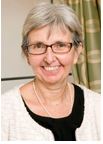Taking time to talk
A blog post written by Professor Jennifer Tieman, CareSearch Director, College of Nursing and Health Sciences, Flinders University
National Advance Care Planning Week is an annual initiative by Advance Care Planning Australia that encourages all Australians, regardless of their age or health status, to make their future health care preferences known. One of the awkward realities of life is that we will all die one day. But a recent study of the prevalence of formal advance care directives (ACD) in Australian hospitals and aged care by Detering et al [1] suggests that only around 30% of older Australians have an ACD documented in their health record. As an Ambassador for National Advance Care Planning Week, I want to raise awareness of the role of advance care planning and the importance of talking about end-of-life wishes and preferences.
For many of those who die each year, the death is expected. Being aware that death is approaching can help the person to prepare and to do the things that are meaningful or important for them and their families. For others, death may not have been anticipated. This suggests that even if you are fit and well, there can be a value in talking about what you want if something unexpected happens.
As individuals and a society we need to be able to talk about death and dying. This will help us to think about planning for our future needs and to recognise that others may have different views and preferences about care at the end-of-life. And sadly, if we are not comfortable talking about death and dying we also may not recognise and be able to support those in our community who are seriously ill, who are caring for someone who is dying, or who are bereaved. Talking about death and dying needs to become part of our natural conversations.
As one of the team involved with the Dying2Learn MOOC (massive open online course), I learned how important being able to hold these conversations is for health professionals and for the general community. While public health and medical interventions have led to people living longer and managing chronic diseases, the data is starting to show increasing death rates, particularly in older Australians. This will impact on our health and social systems and on our communities. The MOOC showed us that people are willing to talk about death and dying and that they can become more comfortable talking about death and dying. [2] We also learned that being involved in the MOOC, made participants able to carry out practical things such as starting a conversation with family, searching for online resources, or putting through an ACD.
We also need to think about how we create a system that enables the person’s preferences to be captured, documented, filed for future use, available when needed, and then used as intended. It is clear that this is an important issue for state and for commonwealth governments. For example, the first of seven goals in the 2018 National Palliative Care Strategy is for people to understand the benefits of palliative care, know where and how to access services, and to be involved in decisions about their own care. [3] Advance care plans or other similar documents are identified in the strategy as an important mechanism to communicate an individual’s preferences regarding their care.
Effective advance care planning begins with a conversation. So this week, the CareSearch team is inviting staff in the College of Nursing and Health Sciences at Flinders University to join us for morning tea and to take time to talk about advance care planning. We are doing this because our staff can play a major role in building capacity in the health workforce. But we are also doing it because the one thing all of us can do, as individuals, family members, colleagues and neighbours, during National Advance Care Planning Week is to ask a question or start a conversation about death and dying.
References
- Detering KM, Buck K, Ruseckaite R, Kelly H, Sellars M, Sinclair C, et al. Prevalence and correlates of advance care directives among older Australians accessing health and residential aged care services: multicentre audit study. BMJ Open 2019;9:e025255. doi:10.1136/bmjopen-2018-025255
- Tieman J, Miller-Lewis L, Rawlings D, Parker D, Sanderson C. The contribution of a MOOC to community discussions around death and dying. BMC Palliat Care. 2018 Feb 20;17(1):31. doi: 10.1186/s12904-018-0287-3.
- Australian Government Department of Health. National Palliative Care Strategy 2018. Canberra: Australian Government Department of Health; 2018.

Professor Jennifer Tieman, CareSearch Director, College of Nursing and Health Sciences, Flinders University